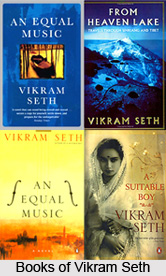 Vikram Seth`s material is replete with undisguised details as to the personal lives of himself and his intimates related in a highly engaging narrative voice. The combination of satire and romance is one of the key ntheme of his novels which happens to be oner ,of the important feature of epic narratives in the late 20th century. The post independence conflict between the Hindus and the Muslims are the subject in some of his novels. One of the peripheral subjects of his novels is the bisexuality or gay, which in the postmodern era considered to be one of the major social issues. The poetries and some of the novels deal with the themes of bisexuality. Concerned with the major problems of the postmodern society, Vikram Seth is considered as one of the prolific writers of the age.
Vikram Seth`s material is replete with undisguised details as to the personal lives of himself and his intimates related in a highly engaging narrative voice. The combination of satire and romance is one of the key ntheme of his novels which happens to be oner ,of the important feature of epic narratives in the late 20th century. The post independence conflict between the Hindus and the Muslims are the subject in some of his novels. One of the peripheral subjects of his novels is the bisexuality or gay, which in the postmodern era considered to be one of the major social issues. The poetries and some of the novels deal with the themes of bisexuality. Concerned with the major problems of the postmodern society, Vikram Seth is considered as one of the prolific writers of the age.
Golden Gate : - In the backdrop of San Francisco, The Golden Gate depicts the story of life and love. The novel is a beautiful unification of drama and poetry.
From Heaven Lake : - Travels Through Sinkiang and Tibet: - A beautiful travelogue "From Heavenly Lake" is the description of the immaculate splendor of Sinkiang and Tibet.
The Humble Administrator`s garden : - In the lyrical syntaxes, the novel "the Humble Administrator`s garden represents the people, culture and tradition of China.
All You Who Sleep Tonight : - All You Sleep Tonight is an anthology of poem depicting eloquently the peripheral theme of love, the ecstasy and agony of love and the palpability of shedding tears.













